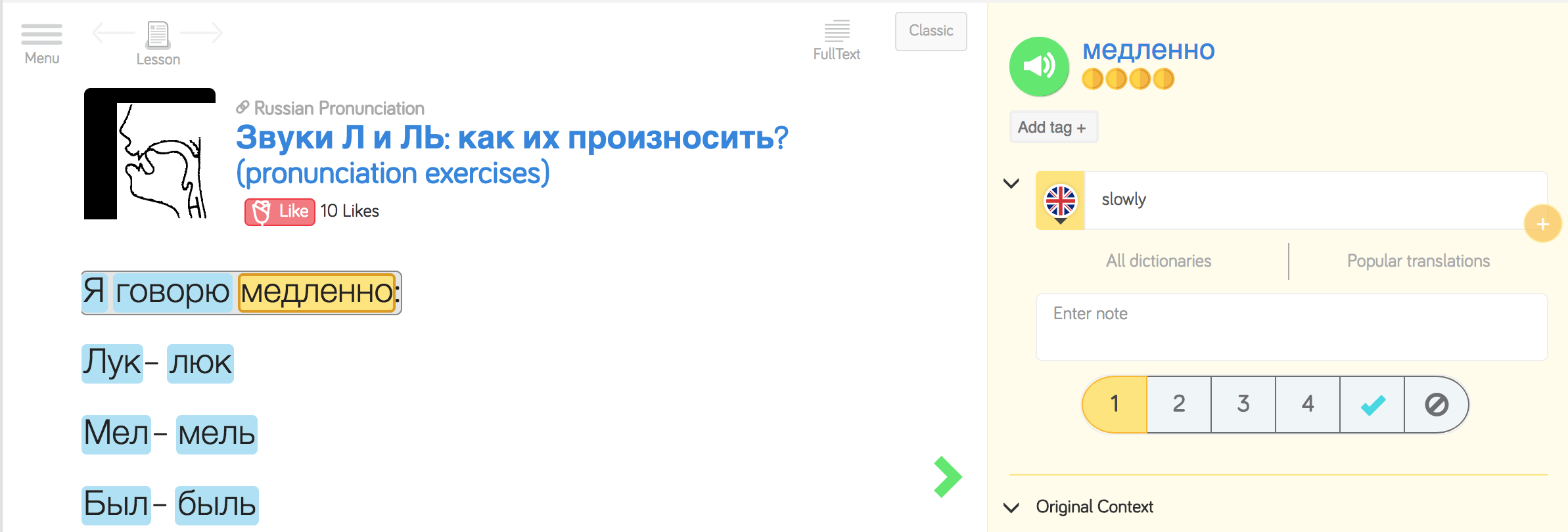Get An Authentic Russian Accent with These 10 Tips
To sound authentic a good Russian accent is of paramount importance. No matter now proficient in a foreign language you are, it is pronunciation that makes the first impression on people. Taking into account that the Russian sounds are formed in a completely different way than the English ones, it is difficult for English native speakers to acquire a good Russian accent without making a special effort.
Let us look at 10 specific features of Russian pronunciation that you should pay attention to when learning Russian.
Unstable Word Stress
Just like in English, there is no common rule where a stress is placed in a word. When learning a new word, it is important to memorize it with the stress, as it can completely change the meaning of the word depending on its placement:
Замо̀к [zamòk] – lock
За̀мок [zàmak ] – castle
Moreover, Russian stress is tricky because it often shifts in a word depending on the case or number of that word:
Рука̀ [rookà] – hand/arm
Ру̀ки [ròoki] – hands/arms
Letters that don’t have sounds
There are two silent letters in Russian: ‘ь’ – the so-called “soft sign” and ‘ъ’ – the “hard sign”. For a foreigner it is extremely hard to distinguish between these two letters, hear them in a word and understand the cases of their usage.
The “soft sign” is used to palatalize a preceding consonant (to make it soft):
Конь [koǹ] – horse
Тень [teǹ] – shadow
Вью̀га [v’jugà] – snowstorm
The hard sign is a phonetic symbol that is used to separate two syllables of the same word. You won’t come across the hard sign very often, and it’s mostly used between a prefix ending in a consonant and the root of a word beginning with е, ё, ю, я:
Объѐзд [abj èst] – detour
It is also placed between a prefix and the root of words of foreign origin:
субъѐкт [soobj èkt] – subject
объѐкт [obj èkt] – object
Sound ‘ы’
The majority of foreigners have trouble mastering this sound. Its pronunciation is remotely similar to the sound ‘i’ in English, like in the word ‘kit’, but the tongue should be retracted and the back really tense. To a native English speaker this sound presents one of the biggest challenges. Unlike the hard sign ‘ъ’ , you will see the letter ‘ы’ in many words such as
бы̀ть [byt’] – to be
мы [my] – we
мы̀ть [myt’] – to wash
Letter ‘й’ and its pronunciation
A lot of Russian learners confuse ‘й’[j] and ‘и’[i]. ‘й’ has a diacritic sign over it (a sort of a tick) while ‘и’ has none. ‘й’ is a consonant, and ‘и’ is a vowel. That explains the difference in their pronunciation. ‘й’ is a very short sound while you can ‘sing’ the sound ‘и’.
Compare these two words:
санато̀рий [sənɐtˈorɪj] – a holiday center
санато̀рии [sənɐtˈorɪi] – holiday centers
Letters ‘щ’ and ‘ш’
These two letters are quite confusing because they look very similar and foreigners cannot hear the difference between the two sounds they denote.
The sound ‘щ’ is very soft while ‘ш’ is hard. The pronunciation of these words differs greatly:
| Ш | Щ | |
| Tongue | Retracted, back part of the tongue is tense | middle of the tongue is raised towards the hard palate |
| Lips | Rounded | Corners of the mouth and stretched |

Rolled R
Unlike in English ‘r’ in Russian is rolled. To pronounce it properly you have to flap the tip of your tongue behind your upper teeth (against the alveolar ridge). As the air comes out of your mouth when you produce the sound, the tip of your tongue vibrates. Although easier said than done, you can imitate the sound if you practice its pronunciation regularly.
Reduction of Vowels
Just like in English, Russian vowels are reduced in unstressed syllables. In English, the sound schwa [ə] is used in unstressed positions like in the word ‘dinner’. In Russian unstressed [o] reduces to a short [Λ] and unstressed [a] reduces to a sound [ɐ] or [ə] which are pronounced similar to [ы]:
молоко̀ [m Λ l Λ kˈo] – milk
хорошо̀ [x Λ r Λ ʂˈo] – well
машѝна [mɐʂˈinə] – car
Of course, you will be understood if you pronounce all the letters as they are written, but to sound authentic you would need to reduce the sounds like Russians do.
All those unpronounceable consonant clusters!
The Russian language has consonant clusters that do not exist in the English language, such as ‘zdr’, ‘vstr’, ‘vch’, ‘rzh’, etc.:
здра̀вствуйте [zdrˈastvʊjtɪ] – hello
встрѐча [fstrˈet͡ɕə] – meeting
вчера̀ [ft͡ɕɪrˈa] – yesterday
Vowels that contain two sounds
Such vowels as ‘я’, ‘е’, ‘ё’ and ‘ю’ have two sounds when placed at the beginning of a word, after a vowel and after the letters ‘ь’ and ‘ъ’:
я [йа] ~[ja] like in я̀блоко [ jˈabləkə] – apple
е [йэ] ~[je] like in ѐсть [jˈest’] – to eat
ё [йо] ~[jo] like in ё̀лка [jˈolkə] – spruce
ю [йу] ~[ju] like in ю̀бка [jˈupkə] – skirt

Devoicing of final consonants
When a voiced consonant is at the end of a word, it becomes devoiced, i.e. [b]-> [p], [z]->[s], [g]->[k], [v] -> [f], [zh] -> [ʂ]
ду̀б [dˈup] – oak
зака̀з [zɐkˈas] – order
дру̀г [drˈuk] – friend
Although they do not reflect all the rules of the Russian pronunciation, these 10 simple points provide insight into the main peculiarities of the Russian accent. To sound like a Russian, you should begin with listening to the Russian pronunciation carefully and make sure you distinguish its letters and sounds. Check out LingQ’s Russian podcasts, which are free to download and great for improving your listening skills. Once you develop phonemic awareness, you can start practicing the sounds. Begin with exercises where you can read separate syllables with the sounds that present the biggest challenge for you. After you master reading the syllables, you can move on to pronouncing words with those sounds.
There is a huge library of lessons (text and matching audio spoken by native speakers) on LingQ for you to practice your Russian accent with. You can save words and phrases and hear them over and over again. There are lessons on all kind of topics, even pronunciation if you just want to focus on getting those sounds right. LingQ is available for desktop as well as Android and iOS.
Discover the best way to learn Russian from content you love and gain access to thousands of hours of audio and transcripts. Begin your journey to fluency today.

Don’t despair over the Russian pronunciation. It is challenging, but with time you will master it if you practice regularly and listen carefully to how native speakers pronounce the words. Remember that you don’t have to sound 100% authentic to be understood.
***
Ievgeniia Logvinenko is passionate about languages and holds a Master’s degree in English philology. In addition to English, she speaks Russian, Ukrainian, Polish, German and basic French.


